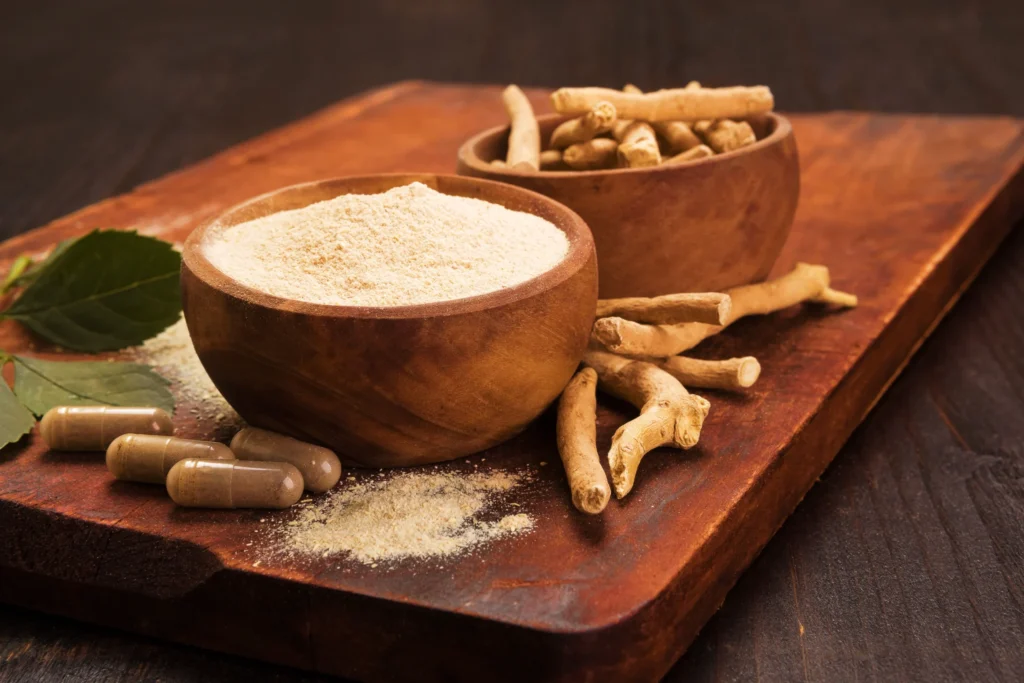Explore the health benefits of Ashwagandha, a renowned miracle herb with a storied presence in ancient wellness practices. This powerful adaptogen, sought after for millennia, offers not only stress and anxiety relief but also a significant boost to vitality and overall health. Known as “Indian ginseng,” Ashwagandha excels in enhancing the body’s resilience against the pressures of modern life, aligning perfectly with the needs of today’s fast-paced lifestyles.

In this comprehensive guide, we’ll delve into everything ashwagandha has to offer. From its rich history and traditional uses to the latest scientific research supporting its health benefits, we’ll uncover how this ancient herb can contribute to modern wellness. Whether you’re new to ashwagandha or looking to deepen your understanding, this article promises to provide valuable insights into harnessing the herb’s potential for a healthier, more balanced life.
Understanding Ashwagandha: The Foundation of Its Health Benefits
Ashwagandha, a small yet mighty plant adorned with yellow flowers, plays a pivotal role in natural medicine. At the heart of its healing power lies the root, meticulously harvested to craft remedies. This plant houses unique compounds known as “withanolides,” celebrated for their profound health benefits. These natural wonders aid our bodies by diminishing inflammation— a common cause of swelling and pain— warding off illnesses, and significantly reducing stress levels.
The magic of ashwagandha in managing stress captivates many. It adeptly fine-tunes our body’s stress response system, akin to an internal communication network signaling when to ramp up stress or dial it down. Ashwagandha steps in as a harmonizing force, ensuring this system operates smoothly. It’s as though we have a constant companion, ever-ready to ease our minds and nurture a sense of tranquility.
In essence, ashwagandha emerges as an ancient herb with timeless relevance, offering a multitude of benefits, particularly in stress management. While scientists continue to unveil its secrets, it’s evident that ashwagandha stands as a beacon of wellness, promising improved health and well-being.

Exploring the Health Benefits of Ashwagandha: From Stress Relief to Immune Support
Ashwagandha stands as a cornerstone in Ayurvedic medicine, celebrated for its myriad health benefits that extend far beyond stress relief. This potent herb enhances everything from brain function to muscle strength, offering a holistic approach to wellness. Let’s delve into how ashwagandha can be a key player in modern health care.
Combatting Stress and Anxiety with Nature’s Ally
Ashwagandha shines as a natural solution for managing stress and anxiety. Picture having a trusted ally that keeps you serene through the chaos of daily life. By modulating the body’s stress hormones, notably cortisol, ashwagandha ensures a calmer, more balanced state of mind. Research highlights its efficacy in reducing stress and anxiety, proving it’s more than just an ancient remedy—it’s a modern-day stress buster.


Boosting Brain Power and Mental Clarity
Beyond calming nerves, ashwagandha is a boon for brain health. Acting as a mental tonic, it sharpens memory, focus, and cognitive prowess. Whether you’re pursuing academic excellence or aiming to stay mentally agile with age, ashwagandha supports your cognitive endeavors. Its antioxidant properties safeguard neurons, promoting brain health and enhancing mental functions.
Enhancing Strength and Accelerating Recovery
Athletes and fitness enthusiasts can reap significant benefits from ashwagandha. Imagine achieving your fitness milestones with increased muscle strength and quicker recovery times. Ashwagandha’s anti-inflammatory and pain-relieving effects not only aid in muscle growth and endurance but also in faster recuperation post-workout. It’s the edge you need for superior physical performance and resilience.
Bolstering Immune Defense
In an era where health is paramount, ashwagandha emerges as a natural immune enhancer. It fine-tunes the immune response, ensuring your body effectively wards off threats without overreaction. This herb optimizes immune function, acting as a shield against infections and diseases—your personal health guardian.
Unlocking Additional Health Advantages
The spectrum of ashwagandha’s benefits is broad, touching on heart health by improving circulation and lowering cholesterol, aiding in blood sugar management for diabetics, and mitigating bodily inflammation. Emerging research even points to its potential anti-cancer properties, marking it as a herb with promising therapeutic applications.
How to Use Ashwagandha for Optimal Health Benefits
Incorporating ashwagandha into your daily routine is like adding a superpower to your wellness arsenal. But how exactly do you go about it? Let’s break down the best ways to use this mighty herb to ensure you’re getting the most out of its benefits.
Choosing the Right Form
Ashwagandha comes in various forms, including powders, capsules, and liquid extracts. The choice depends on your personal preference and lifestyle. Powders can be mixed into smoothies or teas for a calming bedtime drink, while capsules are perfect for on-the-go convenience. No matter the form, what’s important is the quality. Look for ashwagandha that’s organic and has been tested for purity.
How Much to Take
Dosage is key when it comes to ashwagandha. Generally, a daily dose of 300-500 mg is recommended for stress relief and cognitive benefits. However, for specific health goals like improving athletic performance, higher doses may be effective. Always start with the lower end of the dosage range and see how your body reacts before increasing the amount.
Best Time to Take It
Timing can enhance the benefits of ashwagandha. Taking it in the morning can help provide a stress-relieving, energizing start to your day. Alternatively, consuming ashwagandha in the evening may promote a more restful night’s sleep. Experiment to find what works best for you.
Scientific Evidence and Research Supporting Ashwagandha's Health Benefits
While the traditional uses of ashwagandha have been known for centuries, it’s the scientific backing that really puts its benefits into perspective. Numerous studies have confirmed its adaptogenic, neuroprotective, and anti-inflammatory effects, among others.
The Science Behind the Benefits
Research has shown that ashwagandha can significantly reduce cortisol levels, thereby easing stress and anxiety. Other studies highlight its ability to improve brain function and memory, thanks to its antioxidant properties that protect neural cells. For athletes, ashwagandha has been found to enhance muscle mass, reduce body fat, and improve strength.
However, it’s important to approach these findings with a balanced view. While the results are promising, science always evolves. Ongoing research continues to shed light on how ashwagandha works and its full range of benefits.

Precautions and Side Effects When Maximizing Ashwagandha's Health Benefits
Ashwagandha is generally safe for most people, but like any supplement, it’s not without its cautions. Being informed about potential side effects and interactions ensures you can enjoy its benefits worry-free.
Side Effects
While rare, some individuals may experience mild side effects such as upset stomach, diarrhea, or nausea, especially when taken in large doses. Listening to your body and adjusting the dosage accordingly can help mitigate these issues.
Who Should Avoid It
Pregnant and breastfeeding women should steer clear of ashwagandha, as there’s not enough research to confirm its safety during these periods. Additionally, those with autoimmune diseases or taking certain medications should consult with a healthcare provider before starting ashwagandha, due to its immune-modulating effects.
Interactions
Ashwagandha can interact with certain medications, including those for thyroid, blood pressure, and blood sugar management. Always talk to your doctor before adding ashwagandha to your regimen, especially if you’re on medication.
Conclusion
Ashwagandha offers a treasure trove of health benefits, from reducing stress to boosting brain function and beyond. With the right approach to dosage and timing, and an awareness of precautions, you can safely incorporate this ancient herb into your wellness routine. As research continues to unfold, the full potential of ashwagandha remains an exciting prospect in the world of natural health. Remember, the key to a balanced life is a holistic approach to wellness, and ashwagandha can be a valuable part of that journey.
References and Further Reading
Diving into the world of ashwagandha and its myriad benefits can be both exciting and enlightening. Whether you’re a healthcare professional, a wellness enthusiast, or someone looking to improve their health naturally, there’s a wealth of information available to explore further. Below is a curated list of references and resources that offer deep dives into the scientific research, historical context, and practical applications of ashwagandha. These resources are excellent starting points for those interested in understanding the evidence behind ashwagandha’s health benefits, its usage in traditional medicine, and its potential in modern health practices.
Books
- “The Way of Ayurvedic Herbs: A Contemporary Introduction and Useful Manual for the World’s Oldest Healing System” by Karta Purkh Singh Khalsa and Michael Tierra – This book provides a comprehensive overview of Ayurvedic healing, including detailed information on ashwagandha and its uses.
- “Adaptogens: Herbs for Strength, Stamina, and Stress Relief” by David Winston and Steven Maimes – Offers an in-depth look at adaptogenic herbs, including ashwagandha, detailing their benefits, mechanisms of action, and how to incorporate them into your life.
Scientific Articles and Journals
- Journal of Alternative and Complementary Medicine – Features peer-reviewed articles on the efficacy of ashwagandha in treating various health conditions, including stress and anxiety.
- Phytotherapy Research – Publishes research on the pharmacological benefits of plants, including ashwagandha, especially their roles in improving cognitive function and physical performance.
- Journal of Ethnopharmacology – Offers insights into the traditional uses and scientific investigations of medicinal plants like ashwagandha.
Online Resources
- Examine.com – Provides unbiased, evidence-based information on supplements and nutrition, including an extensive section on ashwagandha.
- National Center for Biotechnology Information (NCBI) – A valuable resource for accessing scientific studies and reviews on the health benefits and pharmacological effects of ashwagandha.
Ayurvedic Resources
- “Charaka Samhita“ – An ancient Ayurvedic text that mentions the use of ashwagandha for its rejuvenating and life-extending properties.
- Ayurvedic Practitioner Guides – Many professional Ayurvedic practitioners publish guides and articles on how to use ashwagandha and other herbs effectively for health and wellness.
